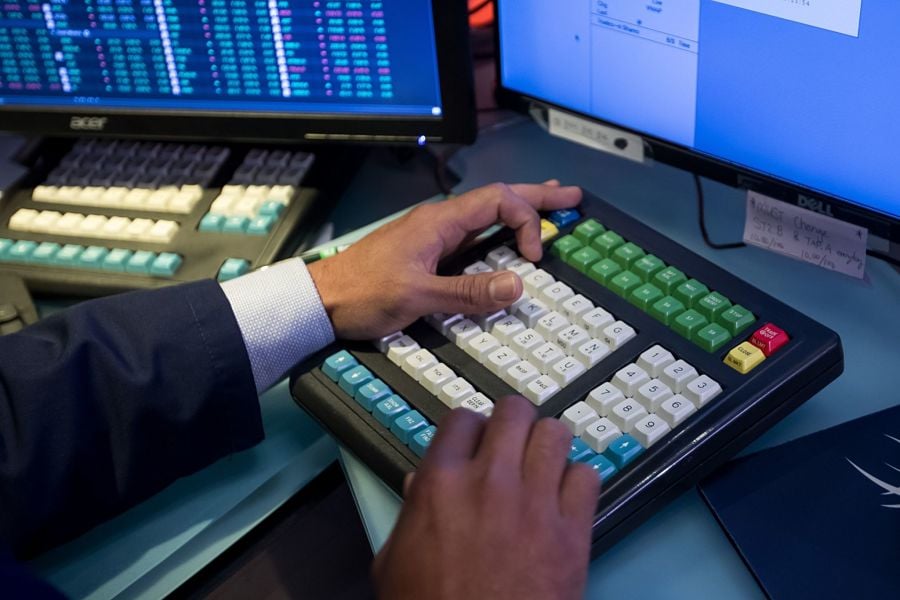

As U.S. stocks climb to their most expensive levels in two decades, the executives in charge of the companies benefiting from the rally are showing signs of anxiety.
Corporate insiders, whose buying correctly signaled the bottom in March, are now mostly sellers. Almost 1,000 corporate executives and officers have unloaded shares of their own companies this month, outpacing insider buyers by a ratio of 5-to-1, data compiled by the Washington Service showed. Only twice in the past three decades has the sell-buy ratio been higher than now.
Data from InsiderInsights.com showed a similar trend. Over the past four weeks, companies with insider selling have outnumbered those with buying by 186%, approaching the 200% level that has tended to mark short-term market tops in the past decade, according to Jonathan Moreland, the firm’s director of research.
The pickup comes after stocks rebounded from the bear-market sell-off, lifting the S&P 500 more than 45% from its March low. Now, with tech stocks at all-time highs even as a pandemic and recession rage, some executives are lightening up.
While some analysts have warned against reading too much into insider sales because factors other than valuations can influence the action, a similar spike this year and in 2018 foreshadowed equity losses.
“Our indicator is now flashing a warning sign,” Moreland said. “I’m not prepared to say everybody should sell everything and short the market because of the recent insider data. The way I’m using it is, I’m more comfortable selling some of my winners. We still don’t trust the market’s recent recovery.”
UnitedHealth Group Inc. Chairman Stephen J. Hemsley and Morgan Stanley Chief Executive James Gorman are among insiders who have sold shares of their own companies this month.
Executives were one of the few groups daring enough to go bargain hunting during the market rout in March. Back then, they scooped up shares at the fastest pace in nine years as stocks plunged into the fastest bear market on record.
Fewer than 200 corporate insiders have bought shares in July, compared with a full-month average of 1,160 during the first half of this year, Washington Service data show.
In terms of total value, insiders sold $52.6 million of shares last week while their purchases reached $3.4 million, according to data compiled by Bloomberg.
Corporate insiders has shown a mixed track record in timing their stock disposals. Their rush to sell at the start of this year proved prescient, as the S&P 500 rose to an all-time high in February before crashing. So did the selling spree in January 2018, when the benchmark index’s advance to what was then a record preceded a correction. The dash to bail in 2017 and 2019, however, was met by continued equity gains.
“When the market is trading as it is, very close to all-time highs, it gives the optics that insiders don’t believe the market being at these levels,” said Robert Pavlik, a senior portfolio manager at SlateStone Wealth. “It presents the appearance that they think their stocks are overvalued. It may be true, but there is no definite way to tell.”
Open-market stocks sales, excluding those set up through 10b5-b programs or related to options, reported in Bloomberg data for July include:
[More: ESG, active management poised to gain amid uncertainty]

Meanwhile, Carson Group extends its acquisition strategy with a Maryland-based advisory practice.

Financial advisor Craig Robson shares the lessons he learned after leaving Merrill Lynch to set up his own practice in the fourth installment of InvestmentNews' new 'Independence Stories' series.

With an aging advisor population, report looks at demographics, structures.

Formerly Fidelity Investments leader will drive move to comprehensive services.

Lawmakers decided not to agree compromise proposal in Trump tax bill.
Orion's Tom Wilson on delivering coordinated, high-touch service in a world where returns alone no longer set you apart.
Barely a decade old, registered index-linked annuities have quickly surged in popularity, thanks to their unique blend of protection and growth potential—an appealing option for investors looking to chart a steadier course through today's choppy market waters, says Myles Lambert, Brighthouse Financial.
